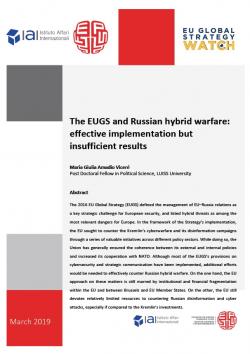The EUGS and Russian hybrid warfare: effective implementation but insufficient results
The 2016 EU Global Strategy (EUGS) defined the management of EU–Russia relations as a key strategic challenge for European security, and listed hybrid threats as among the most relevant dangers for Europe. In the framework of the Strategy’s implementation, the EU sought to counter the Kremlin’s cyberwarfare and its disinformation campaigns through a series of valuable initiatives across different policy sectors. While doing so, the Union has generally ensured the coherence between its external and internal policies and increased its cooperation with NATO. Although most of the EUGS’s provisions on cybersecurity and strategic communication have been implemented, additional efforts would be needed to effectively counter Russian hybrid warfare. On the one hand, the EU approach on these matters is still marred by institutional and financial fragmentation within the EU and between Brussels and EU Member States. On the other, the EU still devotes relatively limited resources to countering Russian disinformation and cyber attacks, especially if compared to the Kremlin’s investments.
-
Details
Brussels, Foundation for European Progressive Studies (FEPS), March 2019, 8 p. (EU Global Strategy Watch ; 11) -
Issue
EU Global Strategy Watch ; 11
Topic
Tag
Related content
-
Ricerca19/07/2018
EU Global Strategy (EUGS) Watch
leggi tutto



